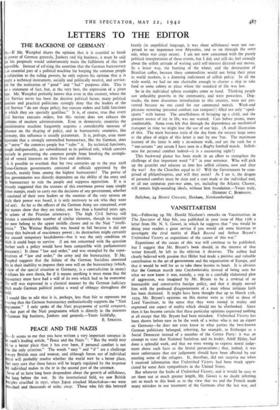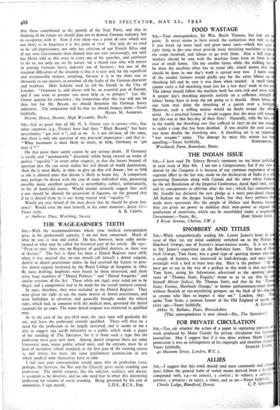VANSITTARTISM
Sta,—Following up Mr. Harold Nicolson's remarks on Vansittartism in The ,Spectator of May 8th, you published in your issue of May 15th a letter from Mr. N. S. Gower, in which he suggests that "you would be doing your readers a great service if you would ask some historian to investigate the rival merits of Black Record and Arthur Bryant's Unfinished Victory as expositions of the causes of this war."
Expositions of the causes of this war will continue to be published, but I suggest that Mr. Bryant's book should, in the interest of that writer himself, be left to the oblivion it deserves. The author had clearly believed with passion that Hitler had made a positive and valuable contribution to the art of government and the organisation of Europe, and that it would be well for us to take these lessons to heart. It is obvious that the German march into Czechoslovakia instead of being seen for what we now know it was, namely, a step in a carefully elaborated plan of aggression, was imagined by Mr. Bryant to be a reversal of an honourable and constructive foreign policy, and that it deeply moved him with the profound disappointment of a man whose intimate faith has been shattered. It might have been thought that up to March t5th, 1939, Mr. Bryant's opinions on this matter were as valid as those of Lord Vansittart, in the sense that they were rooted in reality and expressed one aspect of reality which should not be Overlooked. Since then it has become certain that these particular opinions expressed nothing at all except that Mr. Bryant had been mistaken. Unfinished Victory has been shown before now to be the work of a writer who is not an expert on Germany—he does not even know to what parties the best-known German politicians belonged, referring, for example, to Erzberger as a Social Democrat instead of a member of the Centre Party : it was an attempt to state that National Socialism and its leader, Adolf Hitler, had done a splendid work, and that we were wrong to express moral judge- ment about such facts as the brutal persecutions ; that, indeed, it was most unfortunate that our judgement should have been affected by our meeting some of the refugees. It, therefore, did not surprise me when I received information that Unfinished Victory had been much appre- ciated by some Axis sympathisers in the United States.
But whatever the faults of Unfinished Victory, and it would be easy to set them out at much greater length, Mr. Gower is no doubt referring not so much to this book as to the view that we and the French made many mistakes in our treatment of the Germans after the last war, and that these contributed to the growth of the Nazi Party, and that in thinking of the future we should plan not to destroy German industry, but to co-operate. with it. Now if ever there was a point of view which was not likely to be forgotten it is this point of view. Not only do we tend to be self-depreciatory, not only has criticism of our French Allies and of our own Government been dinned into our ears unceasingly, not only has Hitler told us this story in every one of his speeches, and continues to do so, not only are we by nature not a brutal race who will rejoice in putting German heavy industry out of business ; but one of the essential difficulties of the situation is that it is easy and, for the superficial and irresponsible thinker, tempting, because it is in the short run so obviously to our interest, to overlook all the faults of the German character and tradition. Herr Schacht used to tell his friends in the City of London: "Germany is, and always will be, an essential part of Europe, and if you want to prosper you must help us to prosper." Let Mr. Gower quieten his conscience ; the temptation after this war will not be that, but for Mr. .Bryant, we should dynamite the German heavy industries. The temptation will be that we should finance them.—Yours























 Previous page
Previous page